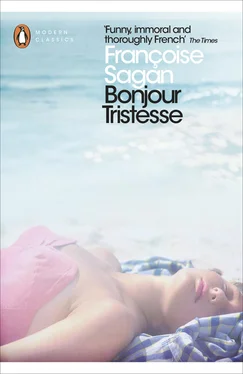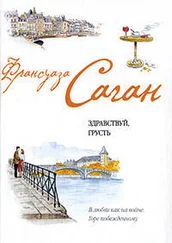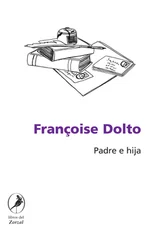Françoise opened the door to me with a half-smile and looking rather scared. I went in and took off my raincoat.
‘Are you well?’ I asked.
‘I’m very well,’ she said. ‘Sit down.’ Then, more formally: ‘I mean, do please sit down.’
I had forgotten that she had started to call me tu . I sat down. She was looking at me, visibly surprised at my pitiful appearance, which made me feel sorry for myself.
‘Would you like something to drink?’
‘Yes, please.’
She automatically poured me a whisky. I had forgotten how it tasted. There was that aspect too: I had been thrown back on my dismal room and student catering. Even so, the red coat they had given me had come in very useful. I felt tense and desperate, so wound up in fact that it almost gave me confidence.
‘So, there we are!’ I said.
I raised my eyes to look at her. She was sitting on the couch opposite, staring at me without speaking. There was still the possibility that we would talk of other things and that, on leaving, I would say in an embarrassed way: ‘I hope you don’t hold it too much against me.’ It was up to me. All I had to do was quickly to start talking before that silence became a confession on either side. But I said nothing. I had at last arrived at a critical moment, that was what I was now experiencing.
‘I would have liked to phone you sooner,’ she said at length, ‘because Luc had told me to. And also because I was sorry to think of you being alone in Paris. But …’
‘I should have phoned you too,’ I said.
‘Why?’
I was going to say ‘to apologize’ but the word didn’t seem strong enough. I started to tell the truth.
‘Because I wanted to. Because, yes, I was lonely. And then because I was sorry to think that you thought …’
I gestured vaguely.
‘You don’t look well,’ she said gently.
‘That’s right,’ I said irritatedly. ‘If I had been able to, I would have come to see you and you would have given me steak to eat, I would have lain down on your rug and you would have comforted me. Unfortunately you were the only person who would have known how to do that and the only person who couldn’t do it.’
I was shaking. My glass was shaking in my hand. Françoise’s gaze was becoming unbearable.
‘It … it wasn’t pleasant,’ I said, by way of excuse.
She took my glass from me, put it on the table and sat down again.
‘I was jealous,’ she said in a low voice. ‘I was jealous of you physically.’
I looked at her. It was the last thing I had expected.
‘It was stupid,’ she said. ‘I knew perfectly well that there was nothing serious between you and Luc.’
When she saw my reaction she immediately made a gesture of apology, which seemed to me commendable.
‘What I mean to say is that infidelity on the physical level isn’t really anything serious; but I’ve always thought that. And especially now, now that …’
She really seemed to be suffering. I was afraid of what she was going to say.
‘Now that I am not so young,’ she concluded, ‘and’ – she turned her head away – ‘not so desirable.’
‘Don’t say that,’ I said.
I protested. It hadn’t occurred to me that the story could have another dimension, unknown to me, a pitiable aspect, not even pitiable, just sad for its being ordinary. I had thought that the story belonged to me; but I knew nothing of their life together.
‘It wasn’t that,’ I said, and I got up.
I went up to her and stood there. She turned towards me and gave a slight smile.
‘My poor Dominique, what a mess!’
I sat down beside her and put my head in my hands. My ears were buzzing. I felt empty. I wanted to cry.
‘I really like you,’ she said. ‘I like you a lot. I don’t like to think that you’ve been unhappy. When I first saw you I thought that we could make you look happy in place of that rather defeated look you had. That hasn’t been a great success.’
‘Unhappy, yes, I have been rather unhappy,’ I said. ‘But then, Luc warned me.’
I would have liked to collapse against her, against her large, generous body, and tell her that I wished she could have been my mother and that I was indeed unhappy; I would have liked to weep a little. But I couldn’t even play that role.
‘He’ll be back in ten days,’ she said.
What was that jolt I felt again in my stubborn heart? This had to be: Françoise had to have Luc again, and what passed for her happiness. I had to sacrifice myself. That last thought made me smile. It was a final effort on my part to conceal from myself how unimportant I was. Since I had no hope, I had nothing to sacrifice. I had only to put an end, or let time put an end, to an illness. That bitter resignation carried with it a certain optimism.
‘Later on, when it’s over for me,’ I said, ‘I shall see you again, Françoise, and Luc too. All I have to do now is wait.’
At the door she kissed me gently. She said: ‘See you again soon.’
But once I had returned to my room I fell on my bed. What had I said to her? What half-baked nonsense? Luc was coming back, he would take me in his arms and kiss me. Even if he didn’t love me, he, Luc, would be there. The nightmare would be over.
Ten days later Luc came back. I knew that because on the day of his return I passed where he lived on the bus and saw his car. I went back to the residence and waited for his phone call. It did not come, not that day nor the next day when I stayed in bed to wait for it, pretending to have flu.
He was there but he wasn’t ringing me. After a month and a half of being away! Despair expressed itself in my shivering, in my wry, stifled laughter and my obsessive apathy. I had never suffered so much. I told myself that this was the last spasm, but that it was hard.
On the third day I got up and went to my class. Alain began taking walks with me again. I listened attentively to what he said, I laughed. A certain phrase obsessed me without my knowing why: ‘Something is rotten in the state of Denmark.’ 32It was always on my lips.
One morning when a full fortnight had gone by, I woke to hear music in the courtyard, emanating generously from a neighbour’s radio. It was a fine andante by Mozart evoking, as it always did, daybreak, death and a certain smile. I lay still in bed, listening to it for some time. I felt rather happy. 33
The landlady called me. There was someone on the phone for me. Without rushing I slipped on a dressing gown and went downstairs. I thought it must be Luc and that it was no longer so very important. Something was ebbing away from me.
‘Are you well?’
I was listening to his voice. It was his voice. Where was I finding this sweetness and calm, as if something living and essential was now flowing from me? He was asking me if I would go for a drink with him the following day. I was replying: ‘Yes, I will, yes.’
I went back up to my room feeling very alert. The music had finished and I was sorry that I had missed the end of it. I caught sight of myself in the mirror and I saw myself smile. I did nothing to prevent it, I couldn’t anyway. I knew I was alone again. I wanted to say that word over to myself. Alone. Alone. So what? I was a woman who had loved a man. It was a simple enough story. There was no reason to make a big deal of it.
Translator’s Note
Bonjour tristesse , a first novel by Françoise Quoirez, only eighteen years old and using the pen name Françoise Sagan, was published in Paris in March 1954 and immediately caught the attention of the French reading public, before going on to win the Prix des Critiques in May of that year. As early as 25 March the long-established London publishers John Murray were approached by a literary agent suggesting that they bring out an English edition. John Murray, who rarely published translations, were initially dubious but by the end of April had embraced the idea, no doubt influenced by the enthusiastic reception of the novel and its young author in France. By that time the American publishers E. P. Dutton and Company had also decided to publish it in English and John Murray, having now identified ‘an extremely suitable translator’, suggested to Dutton that they cooperate over the venture. The translator in question was the London-based Irene Ash, who had read and summarized the novel for John Murray, and by early December her finished translation had been accepted by the publisher. It has ever since reigned as the recognized translation in English of a novel celebrated for having spoken to a generation that was coming of age in the post-war period.
Читать дальше












